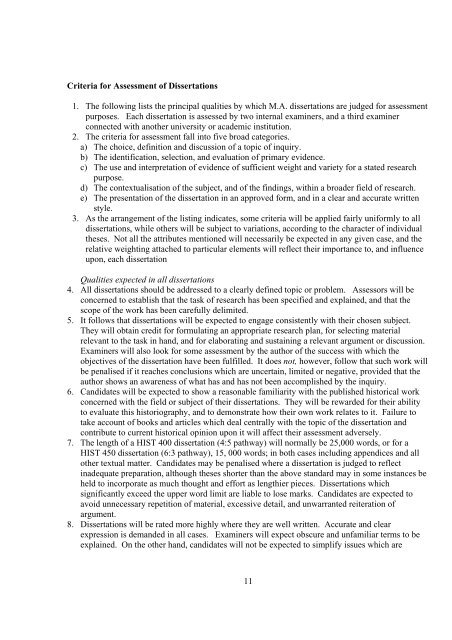M.A. in History Student Handbook 2011-2012
M.A. in History Student Handbook 2011-2012
M.A. in History Student Handbook 2011-2012
You also want an ePaper? Increase the reach of your titles
YUMPU automatically turns print PDFs into web optimized ePapers that Google loves.
Criteria for Assessment of Dissertations<br />
1. The follow<strong>in</strong>g lists the pr<strong>in</strong>cipal qualities by which M.A. dissertations are judged for assessment<br />
purposes. Each dissertation is assessed by two <strong>in</strong>ternal exam<strong>in</strong>ers, and a third exam<strong>in</strong>er<br />
connected with another university or academic <strong>in</strong>stitution.<br />
2. The criteria for assessment fall <strong>in</strong>to five broad categories.<br />
a) The choice, def<strong>in</strong>ition and discussion of a topic of <strong>in</strong>quiry.<br />
b) The identification, selection, and evaluation of primary evidence.<br />
c) The use and <strong>in</strong>terpretation of evidence of sufficient weight and variety for a stated research<br />
purpose.<br />
d) The contextualisation of the subject, and of the f<strong>in</strong>d<strong>in</strong>gs, with<strong>in</strong> a broader field of research.<br />
e) The presentation of the dissertation <strong>in</strong> an approved form, and <strong>in</strong> a clear and accurate written<br />
style.<br />
3. As the arrangement of the list<strong>in</strong>g <strong>in</strong>dicates, some criteria will be applied fairly uniformly to all<br />
dissertations, while others will be subject to variations, accord<strong>in</strong>g to the character of <strong>in</strong>dividual<br />
theses. Not all the attributes mentioned will necessarily be expected <strong>in</strong> any given case, and the<br />
relative weight<strong>in</strong>g attached to particular elements will reflect their importance to, and <strong>in</strong>fluence<br />
upon, each dissertation<br />
Qualities expected <strong>in</strong> all dissertations<br />
4. All dissertations should be addressed to a clearly def<strong>in</strong>ed topic or problem. Assessors will be<br />
concerned to establish that the task of research has been specified and expla<strong>in</strong>ed, and that the<br />
scope of the work has been carefully delimited.<br />
5. It follows that dissertations will be expected to engage consistently with their chosen subject.<br />
They will obta<strong>in</strong> credit for formulat<strong>in</strong>g an appropriate research plan, for select<strong>in</strong>g material<br />
relevant to the task <strong>in</strong> hand, and for elaborat<strong>in</strong>g and susta<strong>in</strong><strong>in</strong>g a relevant argument or discussion.<br />
Exam<strong>in</strong>ers will also look for some assessment by the author of the success with which the<br />
objectives of the dissertation have been fulfilled. It does not, however, follow that such work will<br />
be penalised if it reaches conclusions which are uncerta<strong>in</strong>, limited or negative, provided that the<br />
author shows an awareness of what has and has not been accomplished by the <strong>in</strong>quiry.<br />
6. Candidates will be expected to show a reasonable familiarity with the published historical work<br />
concerned with the field or subject of their dissertations. They will be rewarded for their ability<br />
to evaluate this historiography, and to demonstrate how their own work relates to it. Failure to<br />
take account of books and articles which deal centrally with the topic of the dissertation and<br />
contribute to current historical op<strong>in</strong>ion upon it will affect their assessment adversely.<br />
7. The length of a HIST 400 dissertation (4:5 pathway) will normally be 25,000 words, or for a<br />
HIST 450 dissertation (6:3 pathway), 15, 000 words; <strong>in</strong> both cases <strong>in</strong>clud<strong>in</strong>g appendices and all<br />
other textual matter. Candidates may be penalised where a dissertation is judged to reflect<br />
<strong>in</strong>adequate preparation, although theses shorter than the above standard may <strong>in</strong> some <strong>in</strong>stances be<br />
held to <strong>in</strong>corporate as much thought and effort as lengthier pieces. Dissertations which<br />
significantly exceed the upper word limit are liable to lose marks. Candidates are expected to<br />
avoid unnecessary repetition of material, excessive detail, and unwarranted reiteration of<br />
argument.<br />
8. Dissertations will be rated more highly where they are well written. Accurate and clear<br />
expression is demanded <strong>in</strong> all cases. Exam<strong>in</strong>ers will expect obscure and unfamiliar terms to be<br />
expla<strong>in</strong>ed. On the other hand, candidates will not be expected to simplify issues which are<br />
11
















